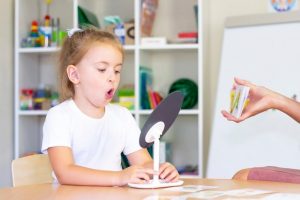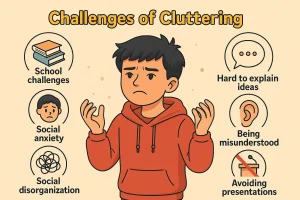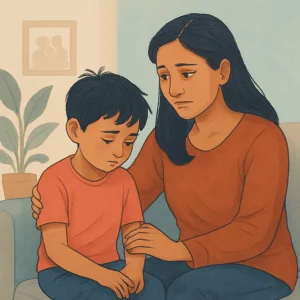6 Simple Tips to Improve Social Skills in Kids with Autism
By Wellness Hub
Last Updated: September 23, 2024
Social skills can be a major challenge for children with autism. Many kids on the autism spectrum struggle with understanding and responding to social cues, such as body language, facial expressions, or even the flow of conversation. This can make it hard for them to connect with peers, express their needs, or build friendships, which are all important parts of growing up.
But here’s the good news: with the right approach, kids with autism can improve their social skills. Whether at home, in school, or in everyday interactions, building these skills can help them feel more confident and comfortable in social situations. Improving social skills in kids with autism not only makes it easier for them to engage with others but also boosts their self-esteem, giving them the tools they need to succeed in different environments.
Also read: Interactive Online Activities to Enhance Social Skills
Tip 1: Use Pet Companionship to Foster Emotional Connections
Pets can play a powerful role in helping children with autism develop social skills. Not only do they offer companionship, but they also create opportunities for children to engage in conversations and interactions. Having a pet gives a child something to talk about, whether it’s introducing their furry friend to others or sharing stories about them. This helps break the ice in social situations, which can often feel overwhelming for kids on the spectrum.
Pets also foster emotional connections. Many children with autism find it easier to form bonds with animals than with people, as pets don’t demand verbal communication or complex social cues. This emotional bond can help children practice empathy and emotional recognition, which are essential components of social interaction. Studies have shown that children with autism who have pets tend to show improvements in areas like answering questions, making introductions, and even understanding the emotions of others.
Tip 2: Simple Games like Bean Bag Toss Encourage Communication
Sometimes, the simplest activities can have the most meaningful impact on social skills development for children with autism. One such activity is a game of bean bag toss. Though it may seem like a basic, fun game, it offers valuable opportunities for non-verbal communication and interaction.
For example, when children want the bean bag tossed back to them, they often use gestures or eye contact rather than words. This encourages them to pay attention to social cues, helping them understand and respond to others more effectively. It’s a great way to practice turn-taking and cooperative play, which are essential social behaviors. These small interactions during a fun game allow children to practice communication in a relaxed and pressure-free environment.
Incorporating simple games like this into daily routines is an easy and enjoyable way to help children improve their social skills. Not only do they get to have fun, but they also build important social communication skills that can carry over into other settings, such as school or playdates.
Tip 3: Video Modeling to Teach Social Behaviors
Video modeling is an effective and enjoyable way to help children with autism learn and practice social skills. This method involves showing children short clips that demonstrate desired behaviors, such as introducing themselves, taking turns, or expressing emotions. By watching these videos, children can see clear examples of social interactions in action, making it easier for them to mimic the behavior in real life.
What makes video modeling so powerful is that it allows children to observe social cues in a controlled environment. They can watch the same clip as many times as needed, helping reinforce positive behaviors. Over time, children start to recognize and replicate the social behaviors they see, enhancing their social abilities in a stress-free way.
Parents and caregivers can use video modeling as part of their routine, ensuring it’s a fun and non-intimidating tool for social skill-building. It’s one of the simple strategies to help autistic children improve social skills, as it provides consistent and clear examples that can be applied to different social settings.
Tip 4: Try Improvisational Theater for Low-Risk Social Practice
Improvisational theater can be a fun and low-pressure way for children with autism to practice social interactions. Through role-playing games and acting exercises, kids can step into different social scenarios, allowing them to practice important skills such as communication, empathy, and understanding emotions. This approach gives children the opportunity to engage with others in a safe environment where there are no “wrong” reactions, which can reduce the fear or anxiety they may feel in real-life situations.
Acting out different scenarios helps children anticipate and react to emotions, improving their ability to understand how to respond in various social settings. Whether it’s pretending to greet someone or practicing how to share, these small exercises help in building social skills in autistic children without overwhelming them.
Improvisational theater not only encourages creativity but also boosts confidence, as children see that making mistakes is part of learning. It’s a wonderful tool for autism and improving social behaviors, helping children develop essential skills they’ll need in everyday life.
Tip 5: Allow Your Child to Take the Lead in Activities
Letting children with autism take the lead in group games or activities can significantly enhance their social skills. When children are given the chance to direct the activity, they gain a sense of control and responsibility. This helps them set their own boundaries and gradually builds their confidence in interacting with others.
By leading, children can practice self-regulation—learning when to step back, when to engage, and how to balance the flow of group interaction. This also gives them an opportunity to observe and manage how their peers react to their leadership, enhancing their ability to read social cues. This approach not only helps them understand social dynamics but also fosters independence in social interactions.
Allowing children to lead activities is an excellent way to improve social interactions in kids with autism. Whether it’s organizing a game or simply deciding the next step in a group activity, giving them this sense of autonomy teaches valuable social lessons in a safe and supportive environment.
Tip 6: Reinforce Positive Social Behavior with Praise
One of the most effective ways to help children with autism build and sustain social skills is by reinforcing positive behavior. Whether your child has made an effort to share, take turns, or engage in a conversation, it’s important to acknowledge these efforts right away. Immediate praise helps children understand which behaviors are desirable and encourages them to repeat those actions in the future.
Reinforcement can take many forms. For some children, verbal praise like “Great job sharing with your friend!” can be enough. For others, you might consider small rewards or incentives, like a favorite toy or a special activity. The key is to make the connection between the behavior and the reward clear, so your child understands what they did well.
Praise not only motivates children but also helps them associate social behaviors with positive outcomes. Over time, this builds confidence and strengthens their ability to engage in social interactions. By consistently reinforcing positive behaviors, you’re supporting your child’s social growth in a meaningful way.
Comparison of Social Skill-Building Activities:
| Activity | Social Skill Focus | Ease of Implementation | Age Suitability |
|---|---|---|---|
| Pet Companionship | Emotional bonding, conversation starters | Easy | All ages |
| Bean Bag Toss | Non-verbal cues, turn-taking | Very easy | All ages |
| Video Modeling | Mimicking behaviors, reinforcing positive social cues | Moderate | 5+ |
| Improvisational Theater | Practicing social scenarios, empathy | Moderate | 6+ |
| Leading Activities | Self-regulation, leadership, decision-making | Easy | 4+ |
| Technology for Communication | Speech practice, non-verbal communication tools | Easy | 3+ |
Also read: Fun Turn Taking Games for Kids: Build Social Skills at Home
Conclusion
Every child with autism is unique, and their path to developing social skills will be different. It’s important to remember that progress may be slow at times, and that’s perfectly fine. Your support, patience, and consistency are key as your child learns and grows. Whether they’re engaging in simple games, spending time with pets, or using technology to communicate, these strategies should fit your child’s individual needs and pace.
If you’re wondering, “How can I improve my autistic child’s social skills?”, small steps can lead to big progress over time. Everyday activities, paired with structured support, can help your child gain confidence and improve their social interactions. For parents seeking more guidance, Wellness Hub offers resources, therapy options, and community support to help you on this journey. Our goal is to make sure you have the tools and support needed to enhance your child’s social skills and make the process easier for everyone.
Frequently Asked Questions:
1. How can I improve my autistic child’s social skills?
You can help improve your child’s social skills by using simple strategies such as engaging in games that promote communication, using technology, or encouraging real-life socialization opportunities. Each child develops at their own pace, so finding what works best for them is key.
2. What activities help kids with autism improve social interaction?
Activities like pet companionship, improvisational theater, and simple games like bean bag toss can all help children with autism practice social behaviors. These activities are fun and provide valuable learning opportunities for social development.
3. How do pets help children with autism build social skills?
Pets can help children with autism improve their social skills by offering companionship and providing a natural way to start conversations. Children may find it easier to bond with animals, which helps them develop emotional connections and communication skills.
4. How do games like bean bag toss help kids with autism improve social skills?
Games like bean bag toss help kids with autism practice turn-taking, use non-verbal communication, and interact with others in a fun and relaxed way.
5. Why is it important to let my child with autism lead in group activities?
Allowing your child to take the lead in group activities helps them develop self-regulation, understand social boundaries, and gradually build confidence in social interactions. It also encourages them to practice making decisions in a supportive environment.
6. What are some simple games that encourage communication in children with autism?
Games like bean bag toss, where children use non-verbal cues to communicate, can help improve social behaviors. These games are fun and low-pressure, offering great opportunities for kids to practice communication.
7. How can I reinforce positive social behaviors in my child with autism?
You can reinforce positive social behaviors by offering praise, rewards, or incentives when your child displays improved behaviors. Immediate reinforcement helps them understand which behaviors are desirable, encouraging them to repeat these actions.
8. What real-life opportunities can help my child practice social skills?
Real-life socialization opportunities, such as visiting parks, joining community events, or attending playdates, provide your child with practical experiences to develop social skills. These activities allow them to practice in natural settings and build a solid social foundation.
9. How does video modeling help children with autism improve social skills?
Video modeling involves showing children videos that demonstrate positive social behaviors. Children with autism can watch and learn from these examples, helping them mimic the behaviors in real-life situations. This method reinforces social skills in a fun and engaging way.
10. What are some strategies for building social skills in children with autism?
Some effective strategies include using pet companionship, encouraging children to lead activities, playing simple communication games, and incorporating technology to practice speech. These methods allow children to develop social skills in a comfortable and supportive environment.
About the Author:
Anuradha Karanam
Speech-language pathologist (7+ years of experience)
Anuradha Karanam is a skilled speech-language pathologist with over 6 years of experience. Fluent in Tamil, Telugu, Hindi, and English, she specializes in parent counseling, speech sound disorders, fluency assessment, and speech-language evaluations. Anuradha excels at working with children with developmental disorders, offering creative and effective therapy programs. Currently, at Wellness Hub, she holds a BASLP degree and is registered with the RCI (CRR No A85500). Her patience, ambition, and dedication make her a trusted expert in her field.
Book your Free Consultation Today
Parent/Caregiver Info:
Client’s Details:
* Error Message









